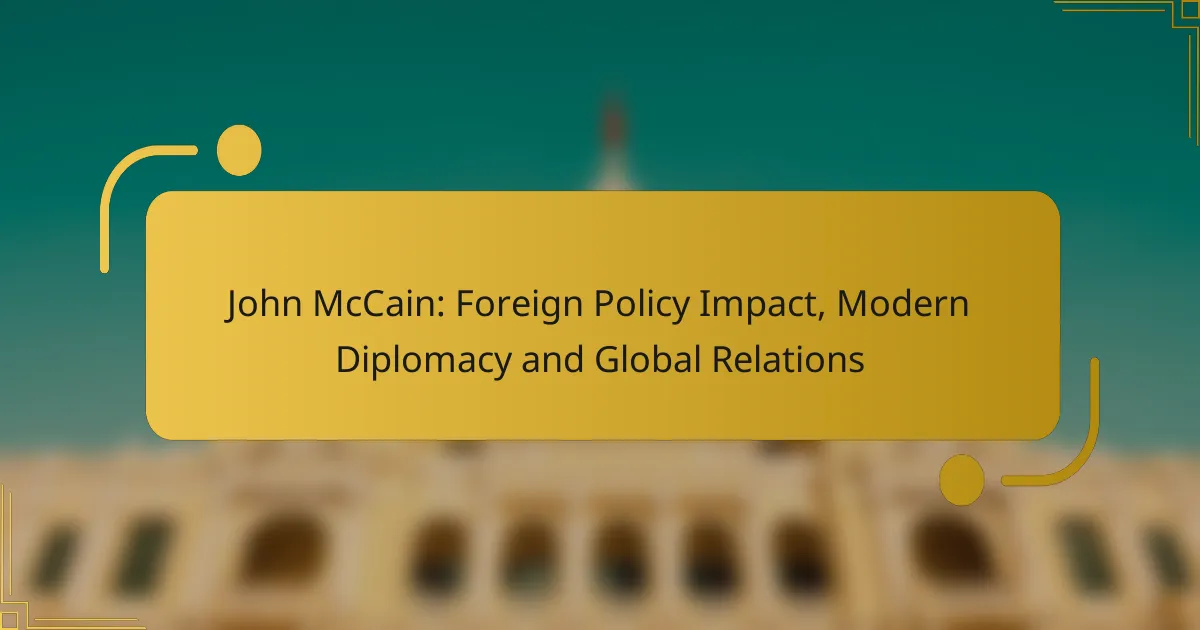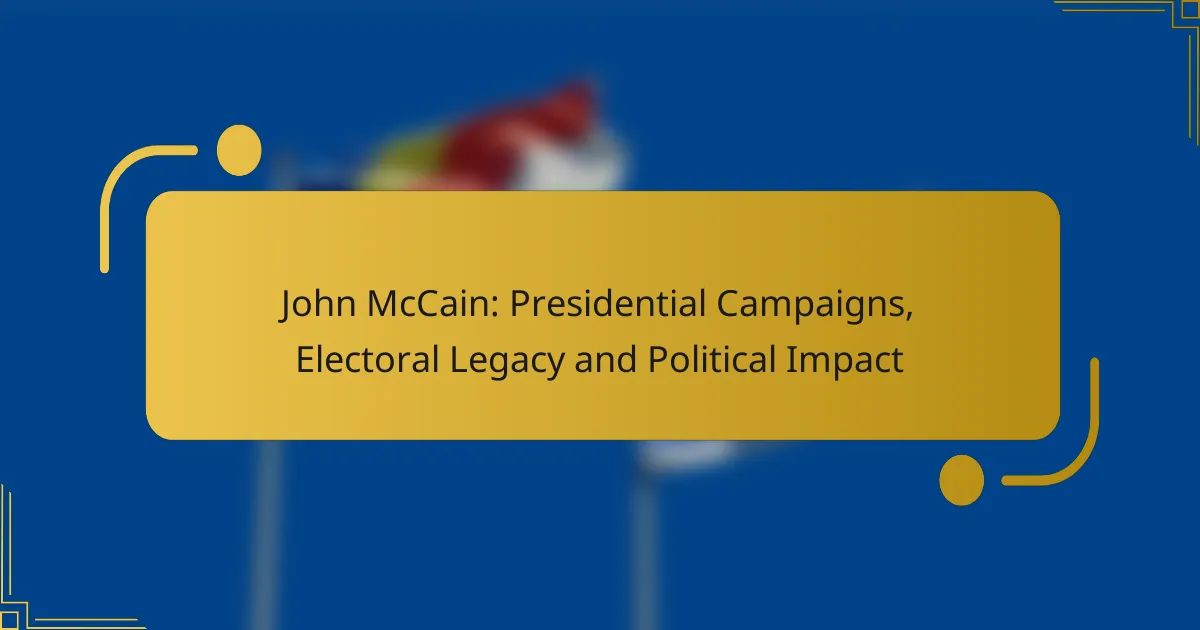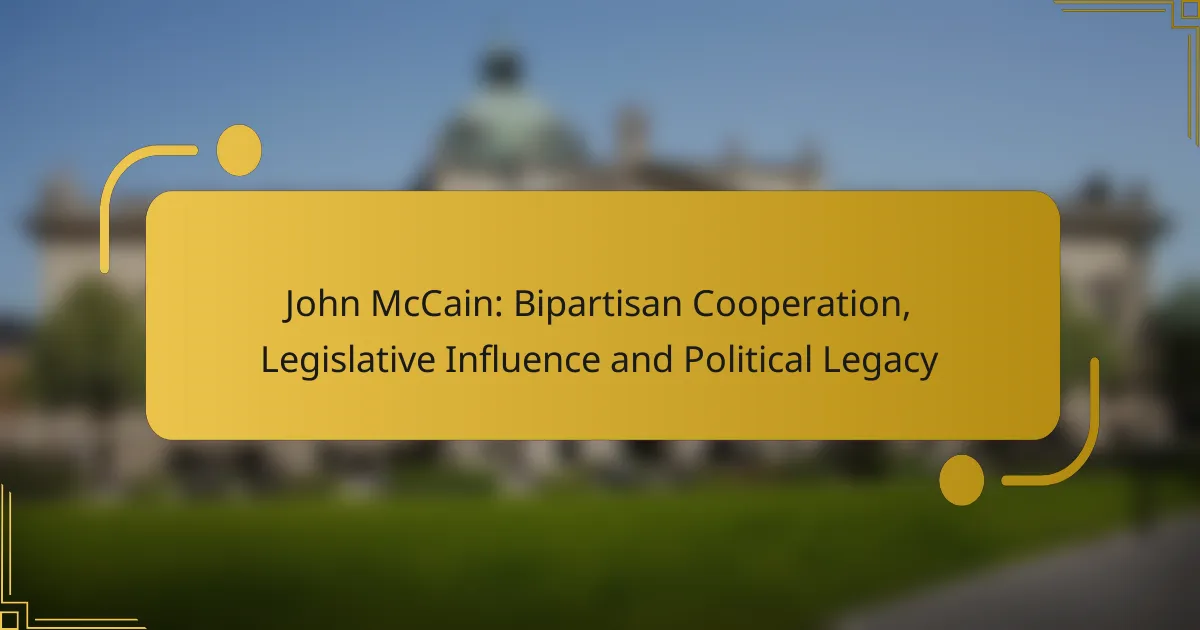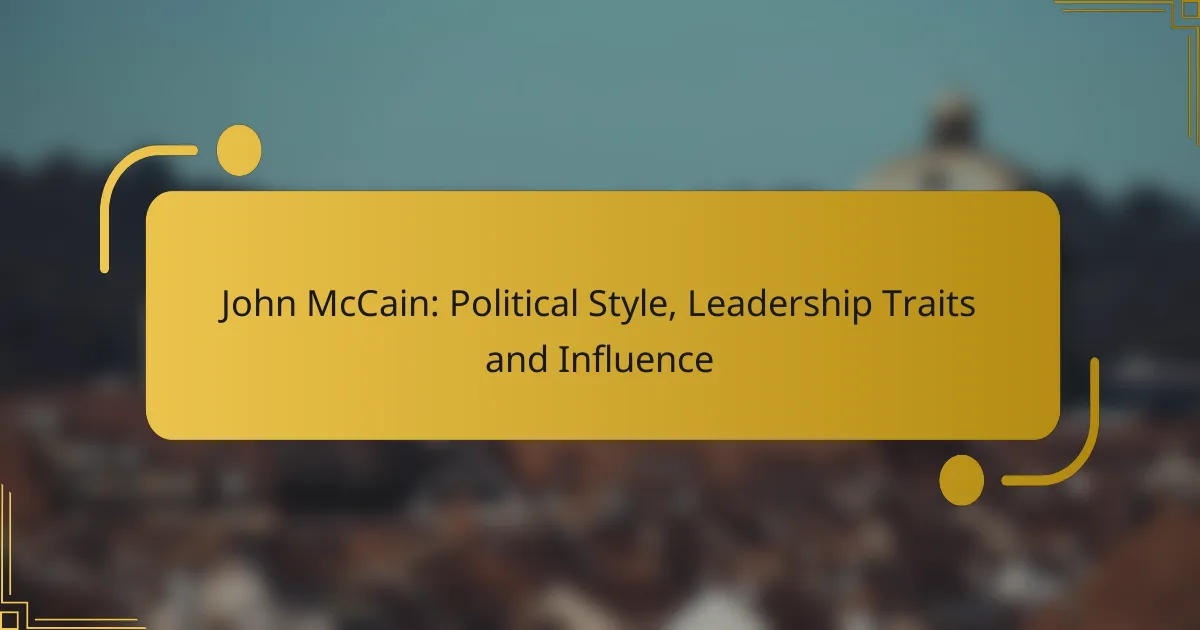John McCain played a pivotal role in shaping U.S. foreign policy through his unwavering commitment to democracy and human rights. His advocacy for a strong American presence in global affairs, particularly against authoritarian regimes, underscored his belief in the necessity of military intervention and active diplomacy. McCain’s military background further informed his perspectives, emphasizing the importance of national defense and the complexities of international conflicts.
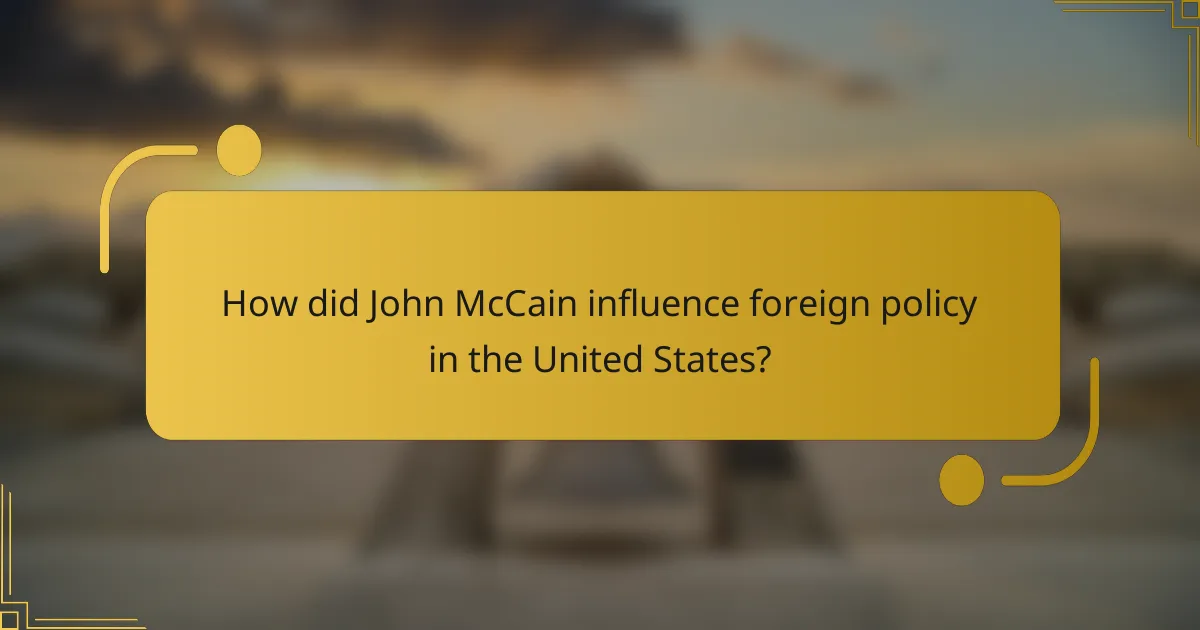
How did John McCain influence foreign policy in the United States?
John McCain significantly shaped U.S. foreign policy through his strong advocacy for democracy, human rights, and military interventions. His approach often emphasized a robust American presence on the global stage, particularly in opposition to authoritarian regimes.
Promotion of democracy and human rights
McCain consistently championed the promotion of democracy and human rights as central tenets of U.S. foreign policy. He believed that supporting democratic movements worldwide was essential for global stability and American security.
His efforts included advocating for sanctions against countries that violated human rights and supporting international organizations that foster democratic governance. McCain’s stance often resonated with both political parties, emphasizing the moral responsibility of the U.S. to lead by example.
Opposition to authoritarian regimes
McCain was a vocal critic of authoritarian regimes, arguing that they posed a threat to global peace and democracy. He often called for a proactive U.S. stance against such governments, particularly in regions like the Middle East and Eastern Europe.
His opposition was not limited to rhetoric; McCain supported various initiatives aimed at undermining authoritarian leaders through diplomatic pressure and economic sanctions. This approach aimed to empower local populations and promote democratic reforms.
Support for military interventions
McCain advocated for military interventions in situations where he believed U.S. interests and humanitarian concerns were at stake. He argued that inaction could lead to greater instability and suffering, as seen in conflicts like those in Libya and Syria.
His support for military action was often accompanied by a call for clear objectives and a commitment to post-conflict rebuilding, reflecting his belief in a responsible use of military power to achieve long-term peace.
Advocacy for NATO expansion
McCain was a strong proponent of NATO expansion, viewing it as essential for maintaining security in Europe and countering Russian aggression. He believed that integrating more countries into NATO would strengthen collective defense and deter potential threats.
His advocacy included support for countries in Eastern Europe seeking NATO membership, arguing that it would enhance regional stability and promote democratic values. This stance was particularly relevant following Russia’s actions in Ukraine and Georgia.
Impact on U.S.-Russia relations
McCain’s foreign policy approach had a profound impact on U.S.-Russia relations, particularly during periods of heightened tension. He was a fierce critic of Russian President Vladimir Putin, labeling him a threat to global democracy.
McCain’s calls for a strong response to Russian aggression, including sanctions and military support for Eastern European allies, shaped the U.S. strategy towards Russia. His perspective underscored the importance of a united front among Western nations in addressing Russian expansionism.
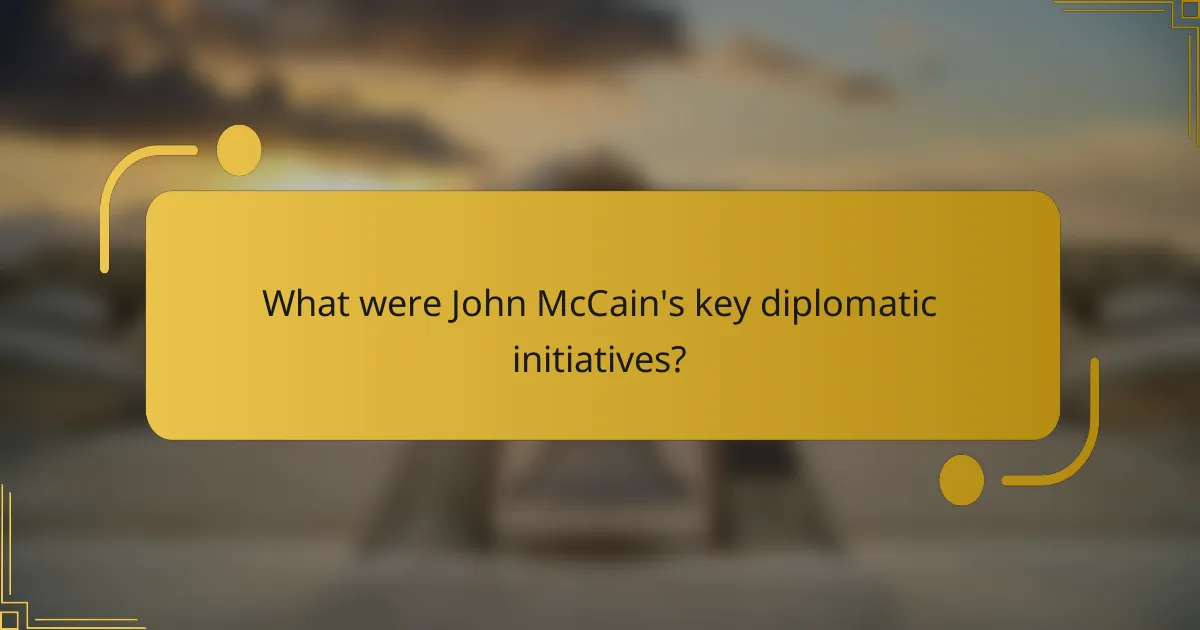
What were John McCain’s key diplomatic initiatives?
John McCain’s diplomatic initiatives significantly shaped U.S. foreign policy, emphasizing a strong stance against authoritarian regimes and promoting democratic values globally. His efforts included co-sponsoring treaties, supporting military strategies, and advocating for oppressed groups in conflict zones.
Co-sponsorship of the Comprehensive Nuclear-Test-Ban Treaty
John McCain co-sponsored the Comprehensive Nuclear-Test-Ban Treaty (CTBT), which aims to ban all nuclear explosions globally. His support highlighted the importance of nuclear non-proliferation and disarmament as essential components of international security.
McCain believed that ratifying the CTBT would strengthen U.S. leadership in promoting global stability and encourage other nations to adhere to similar disarmament efforts. He often emphasized the need for a robust verification regime to ensure compliance with the treaty.
Support for the Iraq War surge
McCain was a prominent advocate for the surge strategy during the Iraq War, which involved increasing U.S. troop levels to stabilize the country. He argued that a stronger military presence was necessary to combat insurgency and foster political reconciliation among Iraqi factions.
His support for the surge was rooted in the belief that a successful military strategy would pave the way for a democratic Iraq, ultimately benefiting regional stability. McCain’s position was controversial, as many questioned the effectiveness and ethical implications of the military escalation.
Advocacy for the Syrian opposition
In the context of the Syrian civil war, McCain was a vocal supporter of the Syrian opposition, advocating for U.S. assistance in their fight against the Assad regime. He believed that empowering moderate opposition groups was crucial for promoting democracy and countering extremist influences in the region.
McCain’s calls for military support included airstrikes against Assad’s forces and providing arms to vetted opposition fighters. He argued that failing to act would lead to a power vacuum, allowing extremist groups to gain a foothold in Syria, which could threaten U.S. interests and allies in the Middle East.
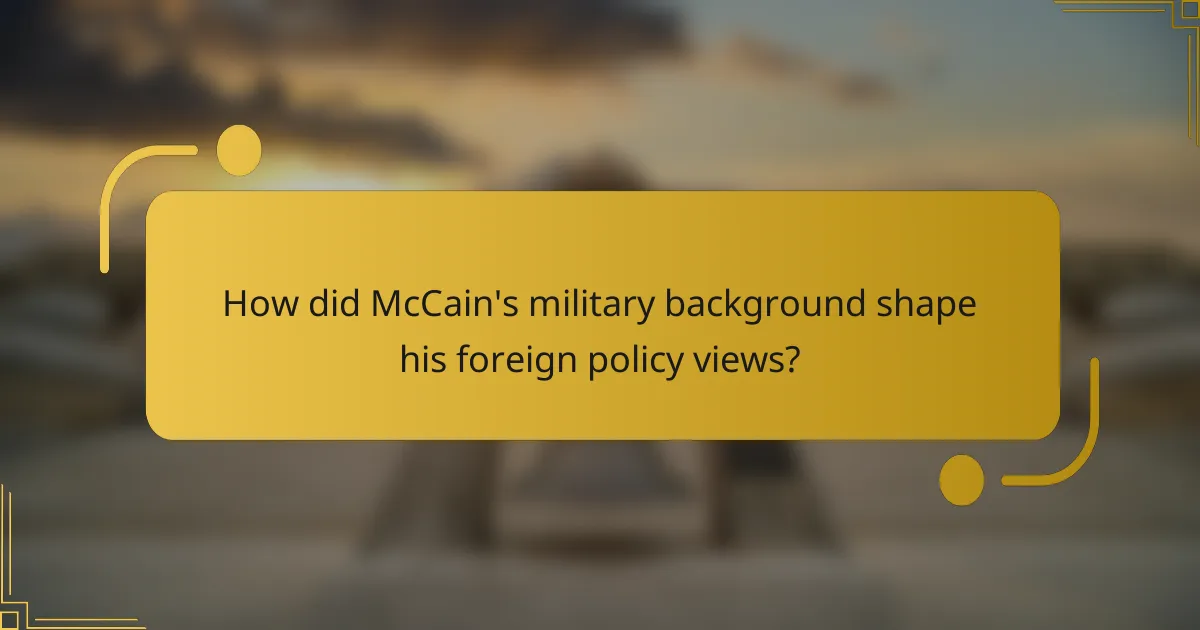
How did McCain’s military background shape his foreign policy views?
John McCain’s military background significantly influenced his foreign policy perspectives, emphasizing a strong national defense and active engagement in global affairs. His experiences in combat and as a prisoner of war instilled in him a deep understanding of the complexities of conflict and the importance of American leadership on the world stage.
Experience as a naval aviator
As a naval aviator, McCain developed a strong sense of duty and responsibility, which shaped his views on military intervention. His time flying combat missions during the Vietnam War exposed him to the realities of warfare, reinforcing his belief in the necessity of a robust military to protect national interests. This experience made him an advocate for maintaining a powerful navy and air force to deter potential threats.
McCain often argued that military strength is essential for effective diplomacy, believing that a credible military presence can enhance negotiation power. His aviation background also led him to appreciate the strategic importance of air superiority in modern conflicts.
Prisoner of war perspective
Being a prisoner of war for over five years profoundly impacted McCain’s worldview and approach to foreign policy. His experiences in captivity fostered a strong commitment to human rights and the treatment of prisoners, which he emphasized in his advocacy for international norms and laws. This perspective made him a vocal critic of regimes that violate human rights, particularly in the context of U.S. foreign relations.
McCain’s time as a POW also reinforced his belief in resilience and the importance of never abandoning allies. He often cited the need for the U.S. to stand by its commitments, especially to countries that have suffered under oppressive regimes.
Influence of military service on decision-making
McCain’s military service played a crucial role in his decision-making process regarding foreign policy. He often approached international issues with a mindset shaped by his experiences in combat, advocating for decisive action when necessary. This approach led him to support military interventions in various conflicts, believing that inaction could lead to greater consequences.
His military background also made him wary of isolationism, as he viewed it as a threat to global stability. McCain consistently argued for a proactive U.S. role in world affairs, emphasizing that American leadership is vital for promoting democracy and countering authoritarianism.
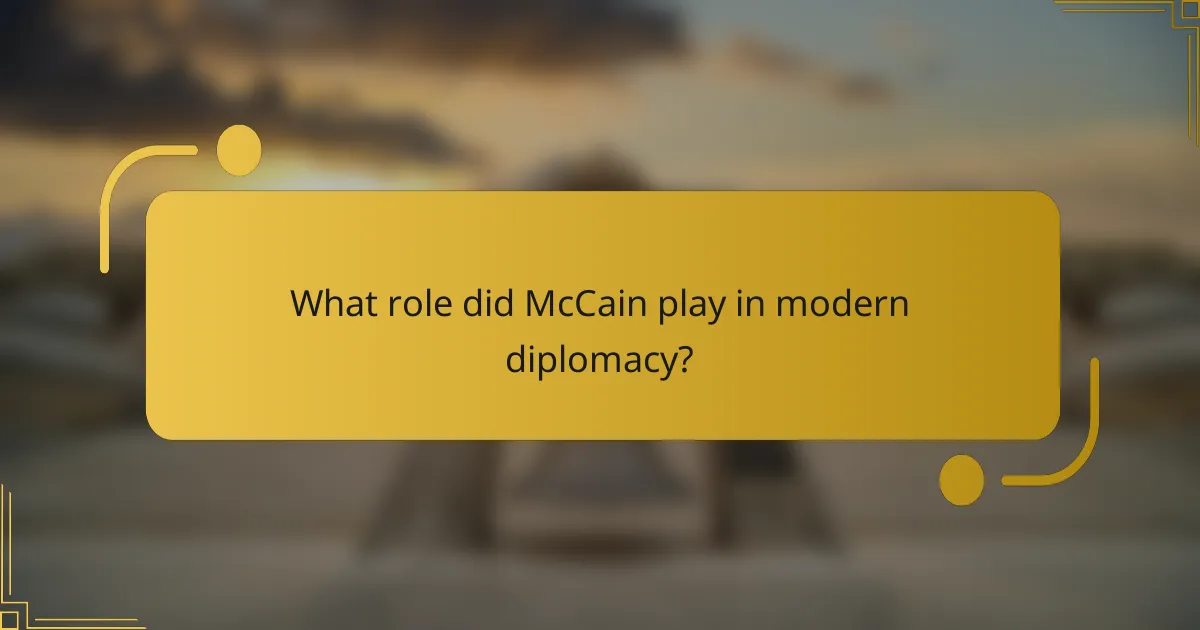
What role did McCain play in modern diplomacy?
John McCain significantly influenced modern diplomacy through his advocacy for strong international alliances and a proactive foreign policy. His approach emphasized engagement with global leaders, bipartisan cooperation, and support for international coalitions, shaping the U.S. role on the world stage.
Engagement with global leaders
McCain was known for his direct engagement with world leaders, fostering relationships that were crucial for U.S. foreign policy. He often traveled to various countries, meeting with heads of state to discuss pressing issues such as security, trade, and human rights.
His willingness to engage with leaders from both allied and adversarial nations helped to maintain open lines of communication, which is vital for diplomacy. For instance, his dialogues with leaders in Eastern Europe and the Middle East aimed to strengthen alliances and address regional conflicts.
Promotion of bipartisan foreign policy
McCain championed a bipartisan approach to foreign policy, believing that national security should transcend party lines. He often collaborated with Democrats on key issues, advocating for a unified stance on matters like military intervention and sanctions against rogue states.
This bipartisan effort was evident in his support for the Comprehensive Immigration Reform Act and the Gang of Eight’s immigration reform proposal, which sought to address both security and humanitarian concerns. His ability to work across the aisle helped to create a more stable and consistent U.S. foreign policy.
Support for international coalitions
McCain consistently advocated for the U.S. to support and lead international coalitions to address global challenges. He believed that multilateral efforts were essential for tackling issues such as terrorism, climate change, and humanitarian crises.
His support for NATO and other alliances exemplified his commitment to collective security. McCain often argued that engaging with international partners not only strengthened U.S. influence but also shared the burden of global responsibilities, making it easier to achieve common goals.
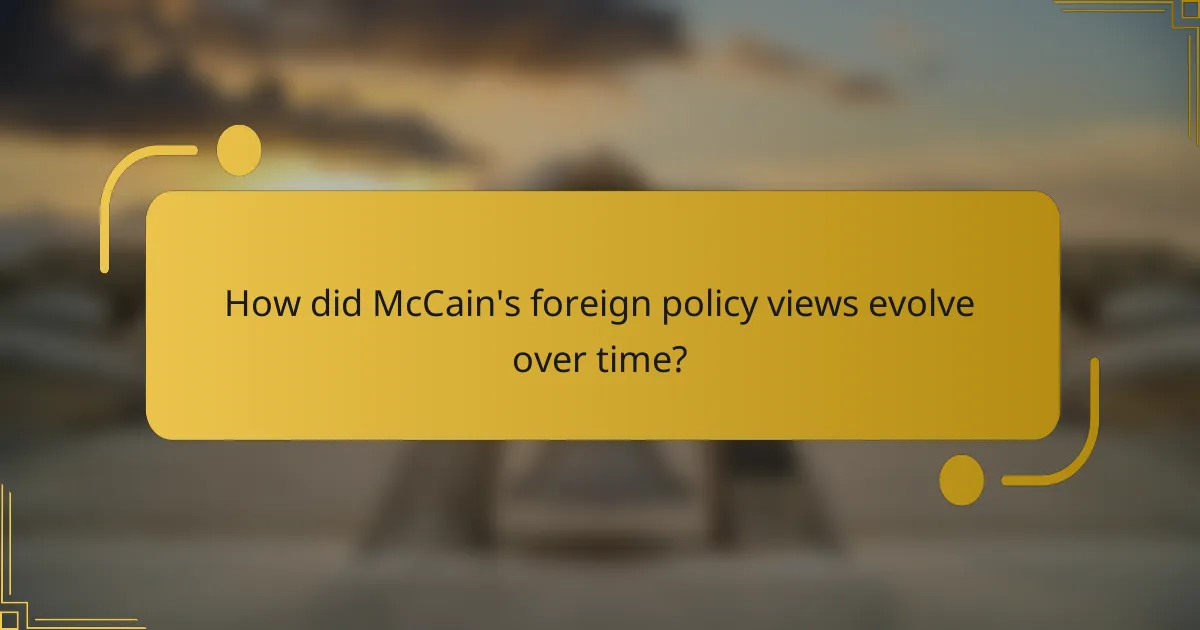
How did McCain’s foreign policy views evolve over time?
John McCain’s foreign policy views evolved significantly throughout his career, shifting from a focus on isolationism to a strong advocacy for interventionism. His experiences, particularly as a prisoner of war and later as a senator, shaped his belief in the necessity of American leadership in global affairs.
Shift from isolationism to interventionism
Initially, McCain’s views reflected a more isolationist stance, particularly during the post-Vietnam War era when many Americans were wary of foreign entanglements. However, as global conflicts emerged, he began to advocate for a proactive approach, emphasizing the importance of U.S. intervention to promote democracy and human rights.
This shift was evident in his support for military actions in the Balkans during the 1990s and later in Iraq and Afghanistan. McCain argued that the U.S. had a moral obligation to intervene in situations where human rights were at risk.
Response to changing global threats
McCain’s foreign policy was heavily influenced by the changing landscape of global threats, particularly after the September 11 attacks. He recognized that terrorism and authoritarian regimes posed significant risks to global stability and U.S. interests.
In response, he advocated for a robust military presence and intelligence operations to combat these threats. He often highlighted the need for a comprehensive strategy that included diplomatic efforts alongside military action to address the root causes of extremism.
Adaptation to new geopolitical realities
As global dynamics shifted, McCain adapted his foreign policy views to address emerging powers like China and Russia. He believed that the U.S. must maintain a strong stance against authoritarianism and support allies in resisting aggression.
McCain’s approach included advocating for NATO expansion and strengthening partnerships in Asia. He emphasized that a united front among democracies was essential to counterbalance the influence of authoritarian regimes on the world stage.
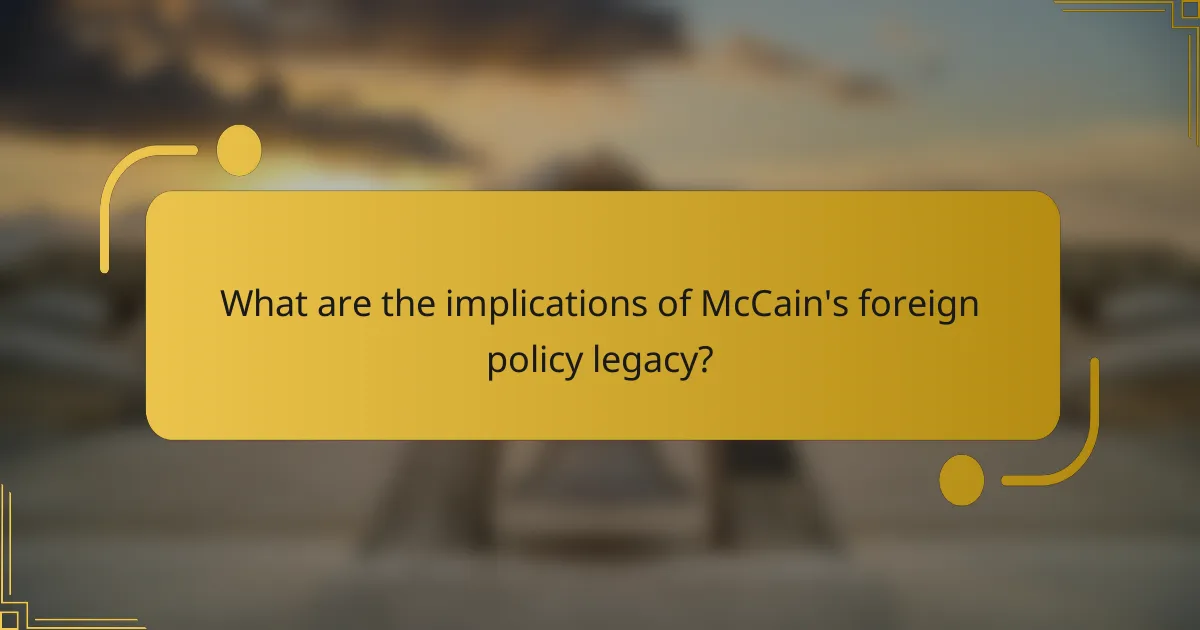
What are the implications of McCain’s foreign policy legacy?
John McCain’s foreign policy legacy significantly shaped U.S. diplomatic strategies and attitudes toward international relations. His emphasis on a strong military presence and support for democratic movements continues to influence American foreign policy debates.
Influence on future Republican candidates
McCain’s approach to foreign policy has set a benchmark for future Republican candidates, emphasizing the importance of a robust international stance. Candidates often reference his commitment to democracy and human rights as a guiding principle in their platforms.
For instance, many Republican hopefuls adopt McCain’s advocacy for military intervention in cases of humanitarian crises, reflecting his belief in American exceptionalism. This has led to a trend where candidates align their foreign policy proposals with McCain’s legacy to appeal to party voters who prioritize national security and global leadership.
However, candidates must balance McCain’s assertive foreign policy with the growing isolationist sentiment within the party. Understanding this dynamic is crucial for any Republican seeking to navigate the complexities of modern diplomacy while honoring McCain’s influence.
